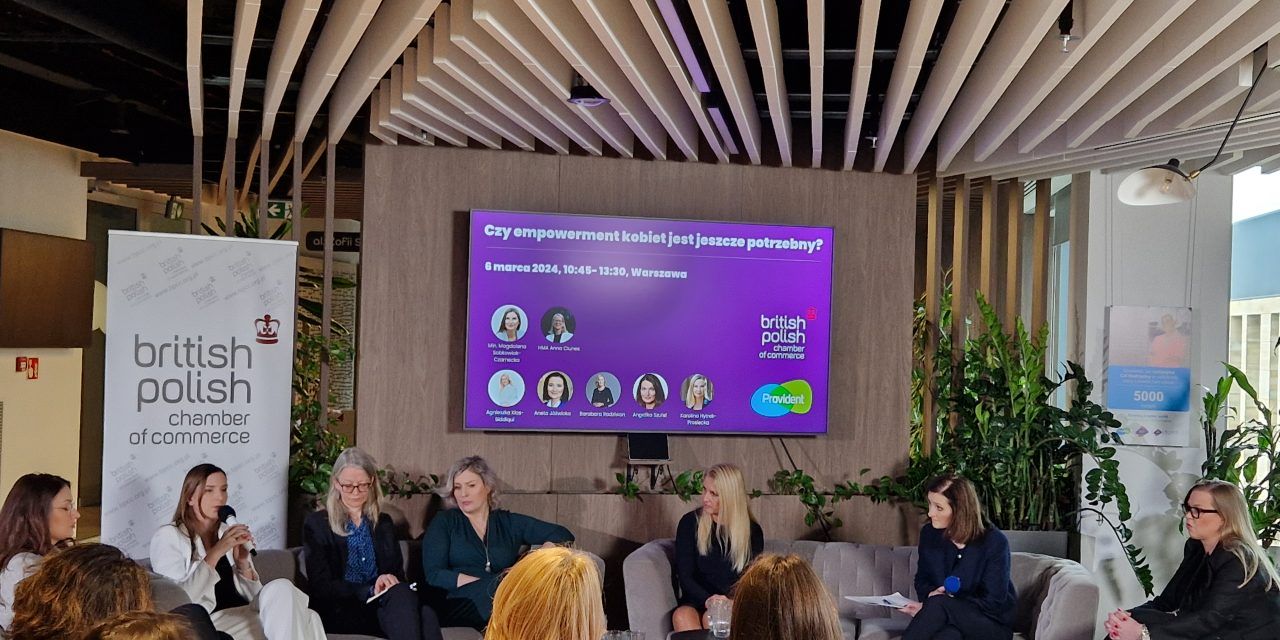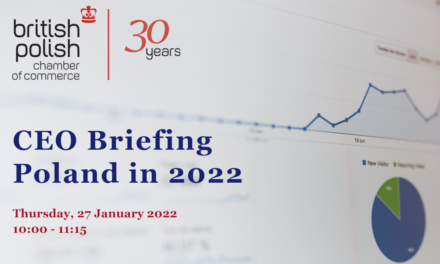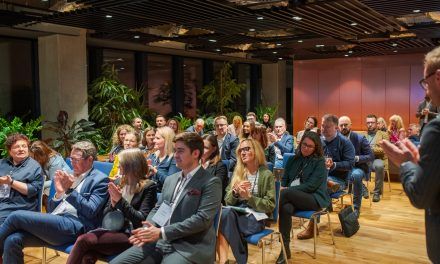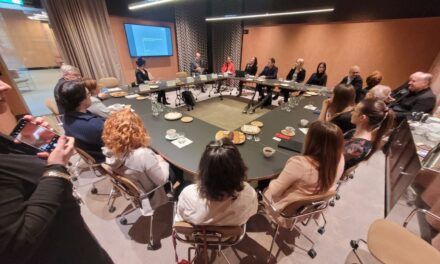A discussion on the occasion of International Women’s Day
For the second time, BPCC and Provident Polska organised a panel discussion on the occasion of International Women’s Day. Representatives from the world of politics, diplomacy, business and the media discussed the need to support women, quotas, and changes in mentality. Also on the agenda were the education of girls and boys, and the legal regulations that contribute to the institutional strengthening of equality between women and men in social and professional life. The meeting was also an opportunity to share inspiring experiences. Despite the positive changes that have taken place in recent years, there is still much to be done in terms of equality. Solidarity and mutual support for women at different stages of their careers are of great importance in this context.
The meeting was opened and moderated by Aneta Jóźwicka, president of the BPCC Board, member of the Board and corporate affairs director of Provident Polska, who stressed the importance for women to be able to combine multiple roles in life. She mentioned the importance of having inspiring examples of women from different walks of life who have managed to do so.
Magdalena Sobkowiak-Czarnecka, under-secretary of state in the Chancellery of the Prime Minister for European Affairs, emphasised in her opening speech that empowerment is still needed, especially in smaller entities, far from political and financial centres. She outlined three key elements for achieving full gender equality: solidarity and mutual support for women, open communication about the difficulties and challenges faced by women, and a gender-friendly legal environment (including the EU Directives on women on boards and on the gender pay gap). Governments have an important role to play in leading by example – a high proportion of women in government sends a strong message to society. On the other hand, being the only or one of the few women on a male board has its advantages – it allows a woman to get more attention. However, it is important not to get caught up in competition, but to work together. The current government has given a clear signal in favour of promoting equality policies by appointing a minister for equality. The problem often exists in the minds of women themselves – the ingrained idea that political engagement is a male thing. Gender education for boys and young men is crucial.
His Majesty’s Ambassador Anna Clunes pointed out that a political framework for equality (including in the context of LGBT people and different ethnicities) is much needed as it contributes to better economic development. The UK government has a Minister for Equality and Human Rights who is also a Minister for Trade. The Ambassador recalled the beginning of her mission to Poland, as the first woman to hold this position at the British Embassy in Poland, when she was surprised to find that her interlocutors in prominent positions were mostly men. As a result, she began working with the Women’s Congress, among others, as part of the 16 Women Leaders for Equality programme.
Agnieszka Kłos-Siddiqui, president of Provident Polska, was the first female CEO in the company’s history, and said that at the beginning of her career she faced stereotypes and a lack of other women among top-level decision-makers. As a result, in 2015 Provident adopted a recruitment policy that values and promotes women and men equally. In terms of senior management positions, the group has a good gender balance. More challenging are the company’s local offices, particularly in sales, where women still face mental barriers to promotion and career development. One of the most important activities in this area is therefore to encourage these women to take the plunge and develop their careers.
Barbara Radziwon, managing director of Tremco CPG Eastern Europe, described her career path from secretary to board member in a challenging construction industry where women are still under-represented. She pointed out that women on boards are a great inspiration to other women. They bring much empathy and sensitivity to the company, which is needed to create good jobs and retain employees (especially relevant in the context of the younger generation).
Angelika Szufel, advocate, legal adviser at CMS Poland, pointed out that top-down quotas still make sense, especially in business. Hard data shows that they lead to better financial results for the companies in which they are applied. Countries that introduced such regulations many years ago (including France, Germany and Norway) have a high proportion of women on their supervisory boards. Poland also has similar regulations in place (e.g. WSE guidelines, ESG reporting and CSRD regulations), but an upward trend is not visible. According to the 2022 report of the Women Leadership in Business Foundation, the proportion of women on supervisory boards is only 17.2%. Much more relevant in this context is the EU Directive on the pay gap, which, despite optimistic Eurostat data for Poland, may be as high as 50% in the higher echelons of large companies).
Karolina Hytrek-Prosiecka, economic and political journalist, pointed out that women’s issues are very much present in the media in various contexts – political, economic and social. Perhaps it is time to move on to other issues, as we are approaching the limit of excluding men from the debate. Women’s empowerment should already be an everyday reality, not gender, but competence should be the key. The journalist also noted that the word empowerment can have different meanings depending on the country or circumstances. According to her, it is simply mutual support within a given environment. The key is to change the perspective – from the level of boards of directors and supervisory boards to the lower levels of careers that need more recognition.
The meeting ended with a lively and sometimes controversial discussion and networking. The one and a half hour discussion went by very quickly and we certainly did not exhaust the topic. Instead, there was plenty of inspiration for future meetings in this format.

































